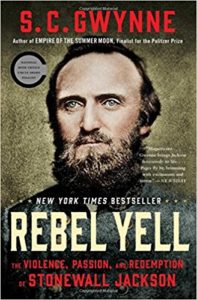I am a bit of a Civil War buff. I find the stories of the men who engaged in that conflict fascinating. A few years ago, I spent a week touring the Gettysburg battlefield, riding horses, walking the distance of Pickett’s ill-fated charge, being led by an excellent tour guide who related these stories so well, we felt like we got to know the characters involved. Jay was really good at what he did. It is like he was designed for this.
Recently, I finished reading Rebel Yell: The Violence, Passion, and Redemption of Stonewall Jackson. Jackson was killed at Chancellorsville, two months before the battle of Gettysburg, so he was not featured in my Gettysburg tour, but he was a fascinating historical character.
Thomas J. Jackson was a bit of an enigma. He was a pious, restrained, polite man, who would appear to make a great professor. In fact, before the civil war, he was a professor of artillery tactics and natural philosophy at the Virginia Military Institute (VMI). But he was, by all accounts, a terrible professor. He recited his lectures from rote and when a student asked a question, he simply repeated his lecture. His students despised him. They called him “Tom Fool” and other mocking names. But he came into his own when he left the classroom for the battlefield.
At the first Battle of Bull Run, parts of the Confederate army were in retreat, but Jackson remained, holding the Union forces at bay. General Bee observed, “Yonder stands Jackson, like a stone wall.” And General Thomas J. Jackson became known as “Stonewall Jackson.”
Stonewall Jackson was one of the most beloved (by the South) and feared (by the North) generals in the civil war. His troops revered him even though he pushed them to extremes. They were known as Jackson’s “foot-cavalry” because of the distance and speed at which they marched.
Jackson was brilliant in strategy and fearless in battle. Part of his genius was his willingness to be with his men in the midst of the battle. His courage was infectious. When he was shot, it was because he was so far forward that his own men mistook him for the enemy as he returned from reconnaissance at night.
He was hit three times, and his left arm was amputated as a consequence. On hearing the news, General Lee said, “Jackson has lost his left arm, but I my right arm.” He was that valuable to General Lee.
These same wounds ultimately took his life. On hearing of Jackson’s death, Union General Gouverneur Warren said, “I rejoice at Stonewall Jackson’s Death as a gain to our cause and yet in my soldier’s heart I cannot but see him as the best soldier of all this war, and grieve at his untimely end.”
It is as if Jackson had been doing what he was designed to do.
In truth, Jackson was never suited for the classroom, but if the war had not come, he would have gone to his grave as an unknown, third-rate instructor. We remember his genius because the war forced the job change.
What About You?
Are you in the right job? Are you in a job that feels like it was designed for you or are you working in a position where you cannot apply your true genius?
For Additional Reading:
Gwynne, S. C. (2014). Rebel Yell: The Violence, Passion, and Redemption of Stonewall Jackson. New York: Scribner.
___________

Dr. Darin Gerdes is a tenured Professor of Management in the College of Business at Charleston Southern University.
All ideas expressed on www.daringerdes.com are his own.
This post was originally created for Great Business Networking (GBN), a networking organization for business professionals where Dr. Gerdes is the Director of Education.
___________

